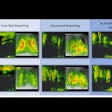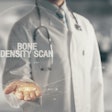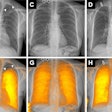Long-term exposure to low-dose radiation can cause DNA damage to lymphocyte cells in interventional radiologists – yet importantly, the doctors are likely not vulnerable to an increased risk of leukemia, according to researchers in Slovakia.
A group at the Slovak Academy of Sciences in Bratislava investigated DNA damage in peripheral blood lymphocytes of interventional radiologists and found a significantly increased number of chromosomal aberrations compared to controls.
"Our results showed an increased frequency of micronuclei and various types of chromosomal aberrations," wrote radiobiologists Dominika Kochanova and Sachin Gulati, PhD, lead authors of a study published September 19 in Scientific Reports.
The origin of leukemia is often associated with the development of preleukemic fusion genes (PFGs), which trigger leukemogenesis, the process by which healthy white blood cells become cancerous, the researchers explained. These PFGs can form due to DNA double-strand breaks caused by radiation.
Using advanced genetic imaging techniques, the researchers analyzed blood samples from 12 interventional radiologists working in six various hospitals in Slovakia and 14 controls who worked in other hospital departments without radiation exposure.
According to the findings, they observed no significant difference in the incidence of PFG in interventional radiologists. They also found no significant associations between years of practice and any of the studied biomarkers.
However, they did find a comparatively increased frequency of micronuclei in the radiologists, which are fragments of DNA produced when ionizing radiation breaks DNA strands.
"We conclude that long-term exposure to low doses of [ionizing radiation] can induce formation of micronuclei in the PBL of interventional radiologists," the group wrote.
Ultimately, whether the increased presence of micronuclei due to DNA damage translates to higher health risks in interventional radiologists will require further research, the authors noted. However, they noted that such damage from low-dose radiation in other radiology workers has been associated with malignancies in previous research.
"In the future, the hospitals should continue to raise awareness of radiation protection principles, introduction of more frequent preventive examinations or stricter exposure limits among medicine workers exposed to radiation," the group concluded.
The full study can be found here.



















